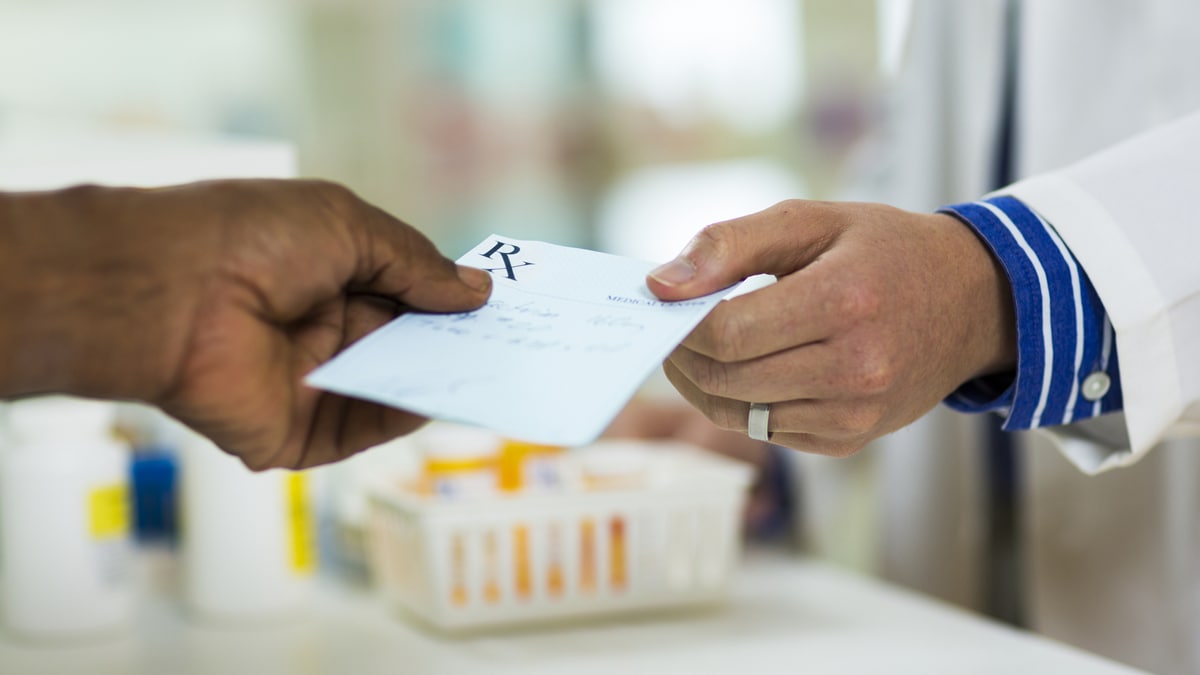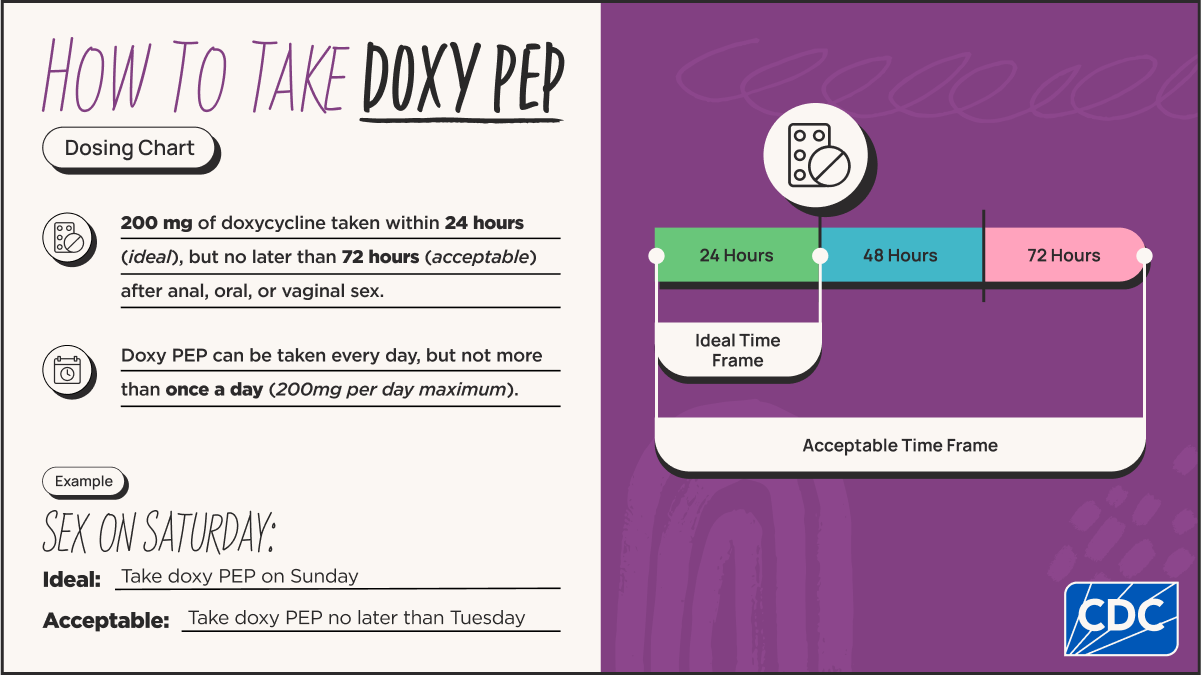Key points
- Taking the antibiotic doxycycline within 72 hours after sex can help some people reduce the chances of getting sexually transmitted infections (STI). This is called "doxy PEP."
- Have an open and honest conversation with your healthcare provider about the types of sex you have.
- Together, you and your healthcare provider can decide if doxy PEP is right for you and discuss other ways to protect your sexual health.

Doxy PEP overview
Doxycycline (or "doxy" for short) is a common antibiotic.
Recent research shows that taking doxycycline within 3 days (or 72 hours) after sex can help some people reduce the chances of getting syphilis, chlamydia, and, in some studies, gonorrhea. This prevention strategy is called doxy PEP.
Populations
At this point in time, CDC recommends that healthcare providers discuss the pros and cons of doxy PEP with all gay and bisexual men and transgender women who have had chlamydia, syphilis, or gonorrhea in the last 12 months. This is based on research showing that doxy PEP is effective for these populations.
Researchers are still learning if doxy PEP will be effective for additional groups of people. CDC will provide updates when we know more.
Talk to your healthcare provider
Talk to your healthcare provider if you think doxy PEP makes sense for you. Have an open and honest conversation about the types of sex you have. This can help you and your healthcare provider decide if doxy PEP is right for you, get a prescription so that you can have the medicine with you when you need it, and discuss other ways to protect your sexual health.
When discussing doxy PEP and your sexual health, your healthcare provider may ask questions that seem personal. Answering these questions will help them better understand how to help keep you healthy and safe.
If your healthcare provider does not answer all your questions, don't be afraid to ask. For example, you may want to make sure you and your healthcare provider discuss
- Any other medication you are taking, including over the counter medications, to make sure doxy PEP will not interact with any other drugs you are taking
- How many times you are likely to use doxy PEP in the next 3-6 months
- How often you should come back for a follow-up visit. You should see your healthcare provider again every 3-6 months
If you are not comfortable talking with your regular health care provider about STIs, there are many clinics that provide confidential and free or low-cost testing and can prescribe doxycycline.
How to take doxy PEP
Dosing instructions
Take 200 mg of doxycycline as soon as possible, within 72 hours, after anal, oral, or vaginal/front-hole sex. Don't take more than one dose of doxy in a 24-hour period, regardless of how many times you have sex in a day. You can take doxy PEP as often as every day if you need.
Your healthcare provider will tell you how many pills you need to take to get one dose of doxy PEP, which is 200 mg of doxycycline.
Do not share your prescription with other people.

Strategies to reduce side effects
In general, people can take doxycycline without significant side effects. You can minimize your risk of side effects like nausea, upset stomach, diarrhea, and sensitivity to the sun with these tips
- Take doxy PEP with some food in your stomach
- Take doxy PEP with at least eight ounces of water and do not lie down for one hour after taking doxycycline
- Do not take doxycycline within two hours of having any dairy products, antacids and supplements with iron, calcium, or magnesium
- Wear sunscreen or cover up to stay protected from the sun while taking doxy PEP, since some people may be more sensitive to the sun when taking doxycycline
Follow-up visits
You should continue to see your healthcare provider every 3-6 months. Regular HIV and STI screening is important to identify and treat any infections. The dose of the antibiotic used in doxy PEP is not strong enough to treat an STI if you have one. Instead, your healthcare provider can help you get the medicine you need.
At these follow-up visits, you can also discuss any issues you have with taking doxy PEP, decide if doxy PEP is still right for you, and get more doses of doxy PEP.
Be mindful of other sexual health needs
Doxy PEP can only help prevent chlamydia, syphilis, and gonorrhea. It does not prevent other common STIs, like HIV, or herpes. Take care of your sexual health with these practices.
- Get tested for HIV
- If you don't have HIV, you have options to prevent HIV, including finding a PrEP provider to see if PrEP is right for you
- If you test positive, you can find a care provider and live well with HIV. HIV treatment will keep you healthy and prevents you from transmitting HIV to your sex partners
- If you are taking doxy PEP, you should still get regular testing for STIs. You can find STI testing sites near you and learn more about how to prevent STIs
- Get tested for viral hepatitis and consider vaccinations for hepatitis A and hepatitis B and other infections that can be transmitted sexually
- Know about other infections like shigella and how to prevent them
Outstanding questions about doxy PEP
Because this is a relatively new strategy for preventing STIs, researchers are still learning
- Whether doxy PEP can negatively affect the communities of microbes, or tiny organisms, living in our intestines or on our skin that help maintain good health or protection from infections
- Whether doxy PEP might make it harder to treat some common germs with doxycycline. Germs developing the ability to defeat the drugs designed to kill them is known as "antimicrobial resistance." Antimicrobial resistance can make some infections difficult, or impossible, to treat
Additional research and monitoring will help answer these questions over time.
For now, to minimize the potential for antimicrobial resistance while maximizing STI prevention, CDC's guidelines focus on the specific groups for whom doxy PEP has proven effective. Initial studies suggest the impact of doxy PEP will be most substantial among these groups of people.
Resources
Learn more about doxy PEP
- Locate doxy PEP near you
- Clinical Guidelines on the Use of Doxycycline Post-exposure Prophylaxis for Bacterial STI Prevention
- Doxy PEP information for healthcare providers
